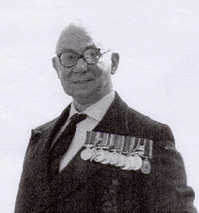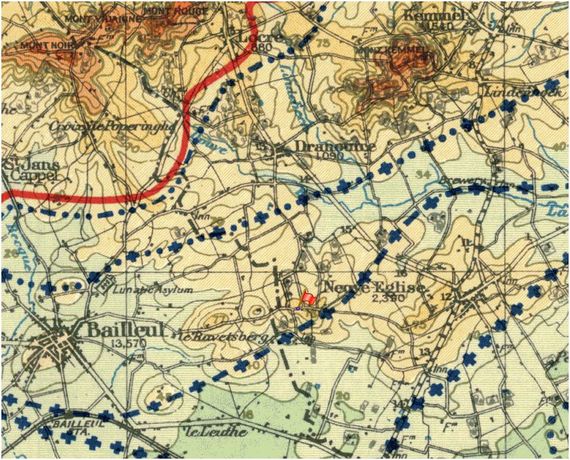



The Parish Church of St George the Martyr, Waterlooville

To mark the 100th anniversary of the outbreak of World War I, we are continuing the serialisation of the diaries of Bugler John McCormack of “A” Company, 9th Battalion, County of London, Queen Victoria’s Rifle. John McCormack is Eileen Oades Uncle and Rosemary Monk’s Great Uncle.
JANUARY 6TH 1915
The Germans got the wind up, throwing starlights everywhere, just at the rear of these trenches was a turnip field surrounding a cottage, simply awful this place, here a dead horse, here a pig or a cow, all smelling shocking, on we go plodding through it all, arrive destination still raining for the next day - retire to dugouts, still raining and it’s coming in on everything, shells screaming everywhere. Our gunners are giving it to the blighters today. Night comes; up we go again over the muddy turnip field loaded up with boards and boxes to stand on in the trench. First thing bale out water then get in trench and watch it come in again. However, we finish our 3 days in trenches and return to Neuve Eglise where we stayed for 1 night. When we left the village on Sunday 10th for a 6 day rest in Ballieul returning once more to the Graperies, spent time cleaning up and going out to dinner and cafe or visiting the “Pancake Shop” with my good old chum Lance Corporal “Maggie” Darkin. Medical Inspection here. Left Ballieul January 16th for Dranoutre, billeting in a barn on warm straw. Shocking cold and windy. Sunday 17th - Church Parade, cruel day. Hail and snowstorm. Tuesday 19th unexpected call to firing line. Here it was I was mentioned at headquarters for killing two snipers on Messines Ridge - we relieved the East Surrey Regiment. Splendidly made trenches, got on scene about 8 o’clock after a terrible march with full pack, rifle etc. Of course we had the good old mud bath. It’s wicked the mud and the smell of dead cattle, the wrecked farms improve the scene greatly, the one just here needs studying. Once a prosperous farmer, his home still remains apparently untouched by him, there’s his land, all his straw, and here are our trenches surrounded with horrible mud. We enter them, everything is quiet, out come the old defenders they are relieved, you hear them say “Thank Heaven”. In we go for our spell, down comes the rain. 30 hours without stopping. The big guns are still pouring out their sound of death. What a sight! The chap lying in the trench saturated, had to shift two away with cramp, couldn’t stand, wicked. “Stand to” comes the order. The day is breaking, our last day, thank God and it’s bitter cold this morning, however, that’s preferred to rain, beautiful sunshine follows. Just finished dinner (Bully), when “bang” - they’d got the guns on us, overhead we see a German aeroplane. He’s traversing the whole of the trench giving the range. Over come the shells bursting on our wire entanglements, now on the parapet everywhere but home. They bombarded us twice, pieces of shell dropping into trenches, no casualties, what luck!, guns finish at 5 o’clock. Anxiously waiting for relief, it comes, 8 o’clock, out we go for “Home”, plod through the mud till we strike the road. Straight in front of us the German snipers are potting at us. On we go trusting to luck till we get to a small village called Lindenhook. Hot tea awaits us, very nice too. Now for a 7 mile march to billets all over the ROTTEN cobbles well known to us now. Chaps drop out here and there, done up. We reach the billets and pack right down to a well-deserved rest at 11 o’clock till 12 o’clock next day.
Diaries of a First World War Bugler


JANUARY 24TH 1915, Sunday.
Left billets for 8 days rest in Ballieul, back to the Graperies, pretty comfortable, although cold. Football, cross-country runs and small route marches, we are told to do this by the doctor.
JANUARY 27TH 1915 Wednesday.
Kaiser’s Birthday. Unexpectedly roused out at 2 o’clock in the morning, German attack expected. Drew 24 hours rations, but was not shifted, stand by, big bombardment proceeding at La Basse, rifle fire heard quite distinctly from here and shells - don’t mention it! Had to stand by ready Wed, Thurs, Friday and Saturday during our resting week. However we got together a band, whilst we were thus confined, the instruments included combs, mouth organs, whistles, a Tate’s sugar box for a big drum and a tin biscuit box for side drum which the fellows told me I made speak. With this we amused the rest of the battalion. The conductor, Sergeant Fisher, one of the best. About this time we heard something about a draft coming to join us which, I might say, we needed badly, but we got full corroboration of this on the Saturday after our midday meal, and we quickly got the band together and met the draft of about 200 approaching the billet gate and we played them in to the tune of the British Grenadiers. This made our numbers up to about 500 strong and didn’t they look nice and clean!
The same night we had a concert got up by our splendid leader, Colonel Shipley, T.D., who insisted on the band giving a “Command Performance” which went down very well indeed. Things this week, however, were very windy - we were on thorns all the time expecting another call-out which, however, did not happen. Our rest, or supposed rest, was finished and we left Ballieul once more for the fray on
FEBRUARY 4TH 1915 (1st?) Monday, at 3.30 p.m.
It was a terrific march with full pack etc., which showed the wonderful stamina we had obtained over our incessant training. However, we again visited Neuve Eglise on the way up where our field kitchens gave us tea, and as we resumed our march through this village, I could not help noticing the spot where the shell caught our party on 5th January 1915. We were soon through the village and on the road again. Another mile finished and we arrived at the village of Wolverghem. Of course I cannot describe this place in detail but it does look an absolute wreck, the church which is a massive structure for a small village has managed to keep its spire, but the roof on the back of the church has had a few dropped right on it and the houses are all wrecked, the stink of the place is awful. This village passed, we were on the main road to Messines, our destination, and after a cautious march we eventually reached the mud and started the journey up to the fire trench with the customary plod through the quagmire. However, we were soon there and told off to our positions and we relieved the Bedfords. It was from this trench that a sergeant and men of ‘B’ Company were out in front of the trench patrolling when three distinct shots rang out hitting two men, both managed to return to about 50 yards in front of our trench when the sergeant dropped. He was pierced through the lung with two bullets. He was brought in on a mackintosh and died the following morning. He was buried in the pretty little churchyard of Dranoutre with a string of other British troops. Our time was up so we returned to our old billets for two days.
737 Sergeant Ronald Sweyn Skinner QVR 3rd Feb 1915 Age 26






